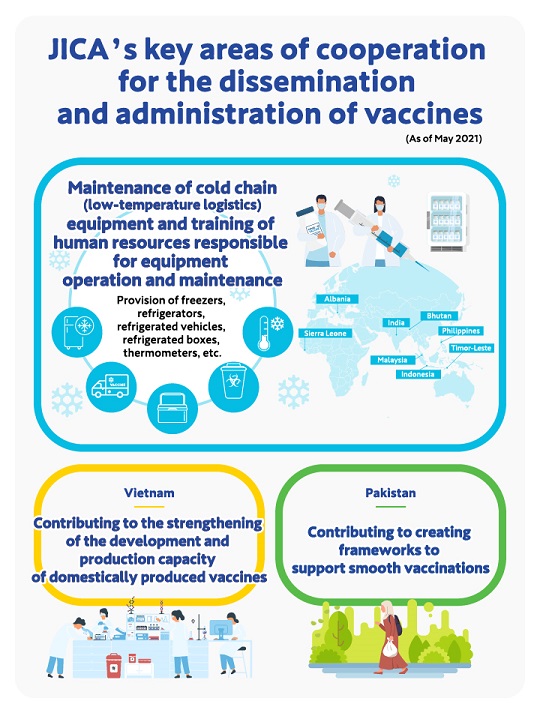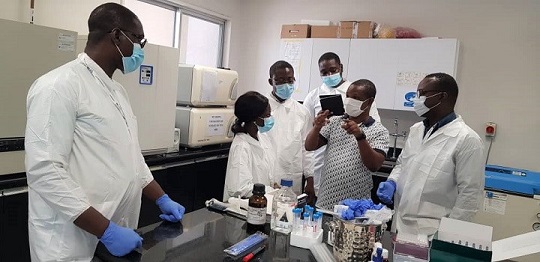Supporting the development of a safe vaccination system against COVID-19 for everyone
2021.06.04
In an effort to contain the spread of the COVID-19 that is ravaging the world, the key is vaccination. To contain the virus on a global scale, it is crucial that vaccines are distributed fairly and without discrimination to both developed and developing countries. For this reason, Japan is partnering with COVAX, an international framework involving more than 180 countries and regions, to co-finance and purchase vaccines to encourage vaccinations in developing countries.
At the COVAX AMC Summit, which was held online on June 2, participants from various countries discussed further funding and other issues aimed at ensuring and promoting equal access to vaccines.
As a part of the effort to improve health and sanitation in developing countries, JICA provided support to strengthen their vaccination systems for polio and other diseases, and to develop and manufacture vaccines on their own for many years. Based on the experience accumulated over time, JICA has also initiated cooperation to ensure that the COVID-19 vaccine reaches the population of developing countries.

Women in Pakistan receiving practical training as vaccination workers (left) and Vietnamese technicians producing the measles vaccine (right), from images of JICA's cooperation to date
“It’s not just about obtaining the vaccine. It's important to create a system that enables everyone to have access to the vaccine; who will administer the vaccine, who will receive the vaccine first, and what preparations the government needs to make to achieve this.”
Explaining this is ONO Tomoko, director of Health Team 2, who also oversees infectious disease control at JICA's Human Development Department.
Even if developing countries are able to obtain vaccines, it is meaningless unless there is a system to deliver and administer them. Even in Japan, there are significant hurdles to establish an efficient vaccination program for COVID-19; from creating an efficient reservation system to securing the doctors and nurses to administer vaccines.
It is a trial-and-error situation even for developed countries to deal with COVID-19, as the infection spreads exponentially across borders and affects a wide range of generations from children to adults. However, for developing countries, with inadequate health facilities and incomplete information, the challenge is much greater. Under such circumstances, JICA is supporting developing countries’ efforts in combating COVID-19, which is built upon its continuing support in strengthening administrative capabilities in the health sector. “JICA’s strength is its ability to take a long-term perspective, to be active in the field while communicating directly with local government officials and individuals, and to listen to the real voices of the people. We grasp the challenges in the field, pay attention to the details, and provide solutions that work in the context of each country,” Dr. Ono says with conviction.
There are numerous issues to be addressed, such as weak health administration and underdeveloped health facilities. In order to facilitate the dissemination of the COVID-19 vaccine, JICA is providing infrastructure support. This includes the implementation of cold chain (low-temperature logistics) equipment for transporting vaccines in developing countries and engaging with equipment maintenance personnel, beginning with eight countries. In locations where water and electricity are not stable, JICA is supporting the establishment of systems tailored to the needs of each country, for instance, providing solar-powered refrigerators for storing vaccines.
Moreover, in Vietnam, the local development of a COVID-19 vaccine is now underway, based on about 20 years of cooperation in producing and developing the measles vaccine. Whereas, in Pakistan, JICA’s cooperation with the country's efforts to strengthen routine immunization to date has also contributed to the creation of a framework for a smooth vaccination system.

“There are many infectious diseases, including malaria and HIV/AIDS, for which no effective vaccine has yet been developed. The rapid development of a vaccine for COVID-19, less than a year after the outbreak, is unprecedented.”
Dr. Ono commented that the global spread of the disease and the enormous threat it posed, in developed and developing countries alike, led to rapid investment in vaccine development. Effective vaccines are a potent cure for infectious diseases. However, it is possible that the COVID-19 viruses may mutate, making the current vaccines ineffective. In order to confront emerging and reemerging infectious diseases that occur in various forms, the challenge is to develop a public health system that does not solely rely on vaccines. So far, the only infectious disease in the world that has been eradicated is smallpox.
“Even if COVID-19 is controlled, JICA will be tasked with enhancing developing countries’ capacity to tackle infectious disease control in the post-COVID-19 era, so that this experience and lessons learned become a part of a resilient health system that can withstand potential future infectious disease threat,” says she.
In certain countries, the level of trust in vaccines is low, and vaccinations are not popular, so it is also necessary to raise awareness that vaccinations are safe and effective. In addition, for developing countries to manage a threat of infectious diseases independently, long-term cooperation is needed, such as improving laboratory capacity and network for early detection and obtaining clinical capability for specialized medical treatment.

Training on laboratory skills for infectious diseases in West African countries, conducted at the Noguchi Memorial Institute for Medical Research in Ghana
Dr. Ono, who just returned from Mozambique, has been carrying out missions for health facilities improvement. In order to identify the different needs of each country, JICA will continue its efforts to carefully listen to the voices of the people on the field, elicit their issues, and find solutions.
scroll